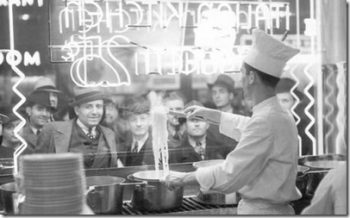Archive for November, 2010
Whatever! Posted by Serena on Nov 29, 2010
When I lived in Nottingham, England, I worked for a while as a school librarian in one of the city’s most ‘challenging’ schools. Working with teenagers is, of course, a challenge in itself, but when they are teenagers from deprived inner-city backgrounds one needs nerves of steel. Come erano maleducati quei ragazzi! (How rude those…
Compriamo del Latte Posted by Serena on Nov 26, 2010
So here you are in Italy. You’ve been practicing your vocabulary, and you feel ready to go out and test your skills by doing a bit of shopping. Well, let’s take it nice and easy and begin with il supermercato (the supermarket), that shouldn’t be too difficult because you can just get what you want…
La Storia della Pasta part – 4 Posted by Serena on Nov 23, 2010
Gragnano – Città della Pasta No journey through the history of pasta would be complete without paying a visit to Gragnano, ‘Città della Pasta’ (‘pasta town’). Located in Provincia di Campania, just 33 kilometers south of Napoli, Gragnano has long been famous for its large scale production of excellent pasta. Gragnano took its first steps…
Messaggini Posted by Serena on Nov 20, 2010
In my blog I like to try and cover as many aspects of the Italian language as possible, e.g. colloquial Italian, grammar, body language, dialects, etc. Here is a relatively new form of written Italian that has come about as a result of the widespread use of text messaging and chatting on the internet. I…
Presente o Futuro? Posted by Serena on Nov 17, 2010
Some time ago I wrote an article dealing with the future tense I Propositi per l’Anno Nuovo. However, as I often receive comments from readers asking why we use the present tense a lot in Italian when we are talking about the future, I’m going to explain in this blog how to know when to…
La Storia della Pasta – part 3 Posted by Serena on Nov 14, 2010
Evoluzione During the mediaeval period, the tradition of pasta, passed down from the ancient Greek, Arabic, and Etruscan cultures, was further developed by the introduction of new forms, such as hollow pasta, and pasta ripiena (filled pasta), and a new method of cooking. In antiquity, pasta was cooked, together with its condiment, directly al forno…
Making Comparisons: di or che? Posted by Serena on Nov 11, 2010
When learning how to make comparisons students of Italian are normally taught to use either più (more) or meno (less) in front of the adjective and use di to translate ‘than’, e.g.: Milano è più grande di Genova Milan is bigger than Genoa La mia borsa è meno pesante della tua My bag is less…



